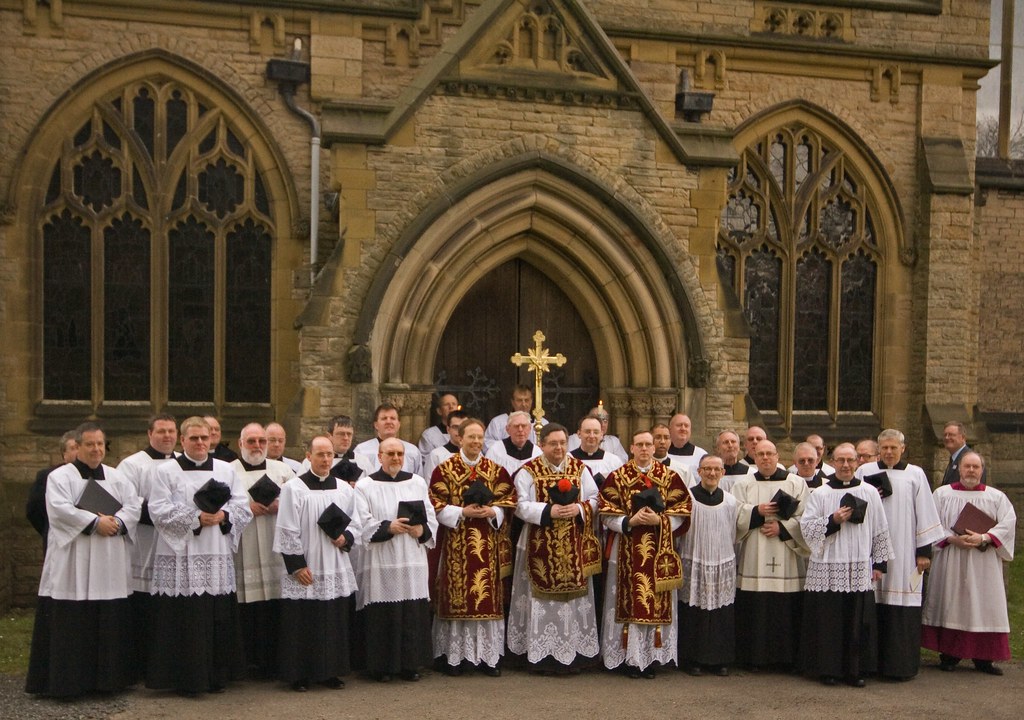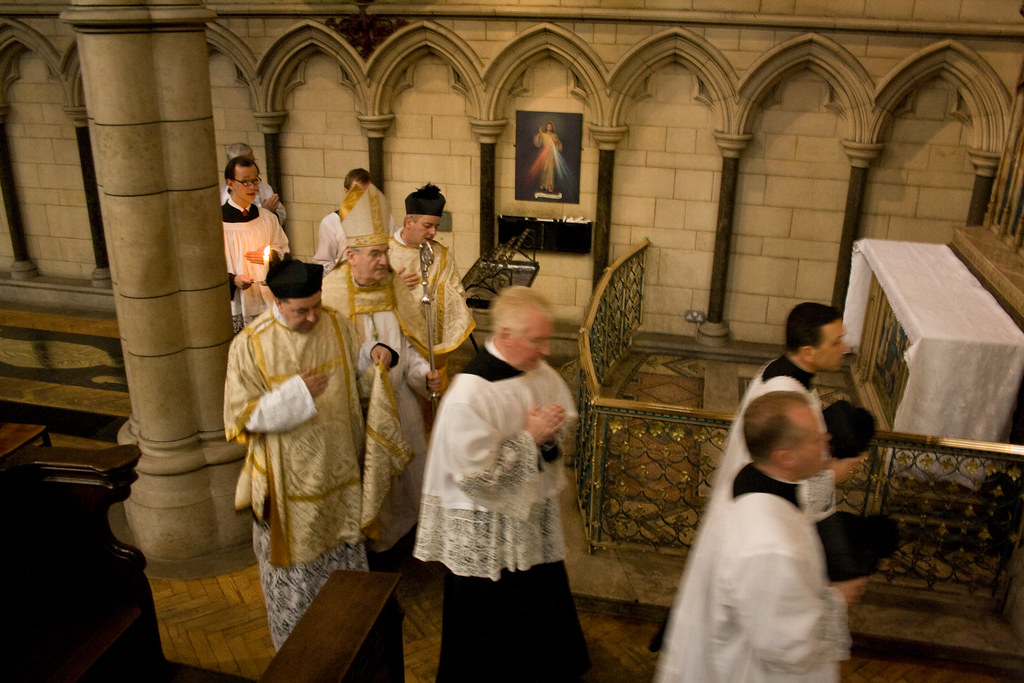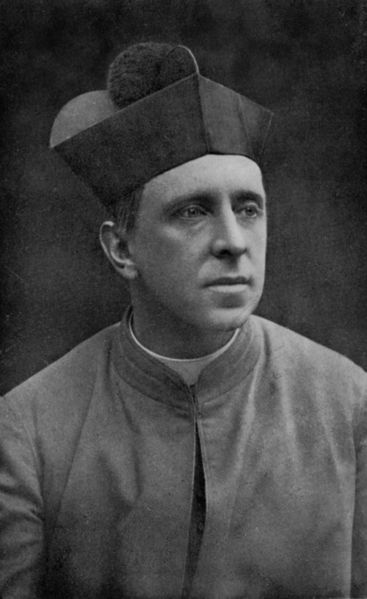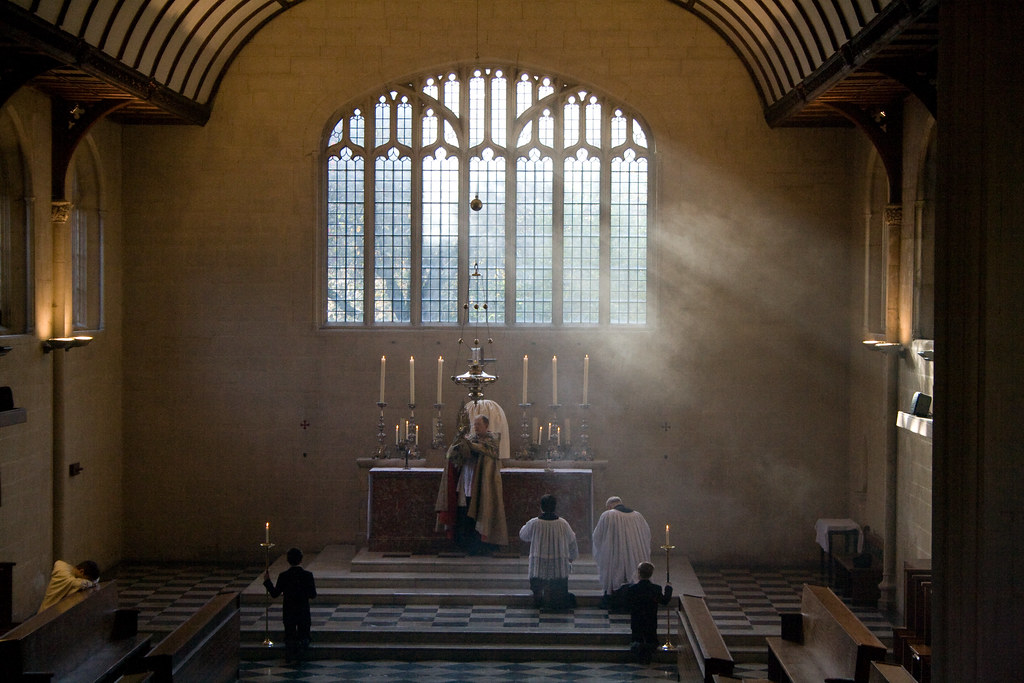A great many Latin Mass Society members and supporters are very concerned about sex education in Catholic schools, and have been for many years. Homeschooling has become a feature of the Traditional Catholic landscape: you will find homeschooling materials next to 1962 Missals on the website of
Southwell Books; homeschoolers are a key constituency for the
St Catherine's Trust Summer School and the
Traditional Catholic Family Alliance, and so on. These are not sandal-knitting hippies: they have simply looked into Catholic schools and do not like what they see. In this, Traditional Catholics are not alone: forceful protests to the Catholic Education Service have been made by the
National Association of Catholic Families and
SPUC, and on a number of blogs, such as
Catholic and Loving It.
The Catholic Education Service, which is an agency of the Bishops Conference of England and Wales, is beginning to notice the chorus of complaints, so it has very kindly produced a document, signed by its Chief Executive Oona Stannard, 'setting the record straight'. So we can all relax and send our children to school knowing that they will be taught in accordance with the Pontifical Council for the Family (PCF) '
The Truth and Meaning of Human Sexuality' (1986) and Pius XI's '
Divini Illius Magistri' (1929), the pertinent magisterial documents? Well, not quite. The CES document leaves certain matters unclear.
Here is my fisk. Emphasis is mine and my comments are
in red.
----------------------
Sex and Relationships Education: Setting the record straight
The Catholic Education Service for England and Wales (CESEW) generally supports Sex and Relationships Education (SRE) within Personal, Social, Health and Economic (PSHE) education1 where this is appropriate to the needs of the children and young people and will help them to develop healthy lifestyles and respect for the sanctity of life.Our expectation is that good SRE is life affirming and that it should assist in reducing the number of teenage pregnancies and abortions. [What is 'good SRE?] It can do this by helping to develop young peoples’ self esteem and belief in the value of married life alongside the behaviours necessary to resist pressures for early sexual activity and sexual relationships outside marriage. [See below.] In all these matters it will be essential that pupils in our schools develop in knowledge and understanding of the teachings of the Church.1) Catholic Education is a three way partnership between home, school and parish.
We endorse strongly the view that parents are the first and primary educators of their children. Good.Many teachers tell us that
parents often welcome the school’s support and contribution to PSHE, building on what parents begin and continue at home.
[But what about the ones who aren't happy? Is the CES taking the support of some parents as the justification of riding roughshod over the views of others?]Similarly, we acknowledge that grandparents and the extended family, including the parish community, often serve as positive role models for children and young people. They have enormous potential to be a positive influence.
2) Much that is proposed for SRE is already taking place in schools.
This is true, particularly with respect to the biological aspects such as being able to name external body parts (for children in primary school) and learning about the physical changes that take place in the human body as children grow (Key Stage 2).
These have been required within the science programmes of the National Curriculum dating back to the early 1990s. There are already programmes of study for personal wellbeing at Key Stages 3 & 4 but these are currently advisory. What the current proposals do is to make it more likely that there will, through a statutory entitlement to PSHE, be more coherence so that, for example, parents will know what is to be provided in PSHE and can expect to see the school’s policies and be able to discuss these.
[This may be an example of the classic argument: 'What you are objecting to has been happening for years, so you've already accepted it.' In fact Sex Ed delivered through the science curriculum is a long-standing reason why parents have withdrawn their children from Catholic schools, since there has never been the chance to withdraw children from it: the claim to respect parents views has been a sham 'dating back to the early 1990s.']3) Schools will choose the materials and resources that they think will best suit the needs of their pupils in teaching and learning about PSHE and SRE within this.
There is no requirement that any specified resources from government or elsewhere will be required to be used. [A model of prose from our chief Catholic educationalist.] Therefore,
it will be up to the individual school, determined by its policy for SRE and the wishes of the Governing Body, to ensure that the resources to be used are chosen wisely bearing in mind the ethos of the school and the development and maturity of pupils. [So what is required? In fact the government demands learning outcomes at different ages which leave little room for manoeuvre.] Parents have a right to see the school’s SRE policy and we would encourage parents who so wish to
ask to see the resources that will be used.
[Don't expect schools to volunteer the information.] We are also expecting that our Catholic university colleges and joint universities will take a proactive role in teacher training and professional development to fit teachers for their important role in teaching PSHE.
[So what is in these materials, and do they conform to the teaching of the Church? An examination of Catholic materials such as the Archdiocese of Birmingham's 'All That I Am' course, or Marriage Care's sex ed course, causes many to be concerned: are these concerns going to be addressed?]4)
Knowing about something is not necessarily the same as promoting it. [Would they say the same about information about how to make bombs or steal cars? It is worth noting the wisdom of Pius XI, speaking of sex ed., 'evil practices are the effect not so much of of ignorance of intellect as of weakness of a will exposed to dangerous occasions, and unsupported by the means of grace.' (Divini Illius Magistri 66) Would the CES endorse this?]Knowing about facts is not the same as promoting particular behaviours. To keep our young people ignorant about facts e.g. to prevent an age appropriate understanding of contraception
[No one is objecting to an 'appropriate understanding': it is a question of the age and maturity of the child. How about the PCF's clear statement:
So as not to disturb this important natural phase of growth, parents will recognize that prudent formation in chaste love during this period should be indirect, in preparation for puberty, when direct information will be necessary. (Truth and Meaning 78) Would the CES endorse this?]its risks or to hide the negative consequences of abortion, does not help to reduce teenage pregnancies;
[Actually, many studies seem to show that information about contraception increases the pregnancy rate: are we going to hear a rebuttal of those studies?] better that such learning take place in the context of the Church’s teaching rather than risk that young people be ill informed by peers, value-free advertising or the media. Young people may experience a great deal of pressure from these sources but a well informed conscience and
details of relevant biological and other facts can help to keep the young person safe, resisting behaviour into which they may otherwise be coerced. [See below.] Not only can “learning about” help children and young people to make the right decisions for themselves, it can also help them to be a force for good with their friends and peers.
[The ethos of the playground is indeed crucial: another reason why Catholics often do not regard withdrawing their children from sex ed classes as sufficient to protect them: they have to be withdrawn from the school completely. What is the effect on playground banter of being given 'information' about body parts and contraception at younger and younger ages?]
5) CESEW strongly wishes that the parental right of withdrawal of their children from SRE could have remained throughout statutory years of schooling.
However,
we can also see the potential benefits of all young people receiving appropriate SRE, perhaps, most particularly as they approach the age of 16
[in English: at the age of 15] with all the opportunities and rights offered to young people at that age.
We were also mindful of the legal advice that had been provided to the Department of Children, Schools and Families (DCSF) on this issue. In making their decision to limit the right of parental withdrawal from sex education, DCSF say that they were acknowledging “the trend in the development of English law over many years towards greater autonomy for children when they are of an age to make decisions for themselves”. They point out that “this can be seen in the long line of cases concerning consent to medical treatment – most famously discussed in Mrs Gillick’s case (Gillick-v-West Norfolk and Wisbech Area Health Authority) but also contained recently in cases such as R(Axon)–v-Secretary of State for Health in 2006”. DCSF have advised that they considered this, along with fuller individual pupil participation in the Education process and the right of the child to be consulted as had been underpinned by the United Nations Convention on the Rights of the Child (1989), to which the United Kingdom is a signatory.
[So the legal system is increasingly undermining the role of the parent as primary educator - is the CES campaigning against this?]
We understand that where our Catholic schools are providing SRE, as most do, that
the level of withdrawal of pupils from SRE is actually very low. [Can we have the figures?] We believe that
this is a sign of the confidence that parents have in the programmes that our schools provide and the dialogue and good communications occurring between schools and parents.
[In many cases it is a sign of ignorance and helplessness. Parents who look into the matter quickly find out that withdrawing their children from sex ed classes only scratches the surface of the problem, that objections will be met with the mantra 'we are now legally obliged to do this', and that the alternative, homeschooling, is a massive undertaking.] We are confident that this will continue in the future.
We very much hope and expect that what is being provided in SRE and the clear publication of school’s programmes and teaching strategies to parents will enable parents to feel content with what is being offered so they will not feel any need to withdraw their child from these lessons. Nevertheless, we remain adamant that parents must continue to have the right of such withdrawal of their children until the age of 15 years.
6)
Pupils will be expected to know that there are different kinds of relationships including Civil Partnerships.CESEW regards this as a very sensitive issue given the importance of marriage and the Church’s expectations that sexual relationships should be reserved for marriage. It is, however, the case that
the media, not least television programmes including “soaps” often watched by relatively young children offer examples of many different types of friendships and relationships. [So does the CES advise parents to stop their children to watch these programmes?] PSHE will provide an opportunity to discuss friendships and different types of relationships
in ways appropriate to the age and maturity of the child in the context of the Church’s teaching. [So what is that teaching?]
In teaching PSHE, teachers will need to act wisely,
mindful that the teachings of the Church must be upheld in our Catholic schools and the innocence of children preserved. [The PCF says that excludes class-room sex ed before puberty. Is that the policy in Catholic schools, or not?] This must take place whilst also acknowledging pupils will often be encountering conflicting messages from external sources. This is an example of where good teaching will need to respond to the maturity of children and the environment in which they live, coupled with respect for the dignity of all human persons, upholding the Church’s teachings.
Children need to have an
age appropriate understanding of the human body and such knowledge does not deprive a child of his or her innocence.
[Is this an acknowledgement that premature information does do so?] For example, the age of puberty is falling, many girls beginning menstruation while still at primary school. It is important that they understand what is happening to them
[no one objects to that] and that boys also understand that this is a natural and healthy part of growing up and that they are taught to respect one another’s development.
7) Don’t forget the “relationships” in SRE Education.
The government has emphasised that good SRE focuses a great deal on the relationships aspect, including teaching about the skills needed for healthy relationships. They require young people to be taught about the importance of marriage and family life.
This may, for example, help young people to avoid unwanted advances and to be assertive about their own beliefs and wishes. Good relationships education rooted firmly in Church teaching will also help in an understanding of one another.
[The government approach is 'Do what you want as long as you really want to do it.' This is supposed to help children resist pressure for premature sexual activity, but it leaves the door wide open for peer pressure: 'Why don't you want it? Are you immature?' For all the talk of Church teaching, it is hard to escape the impression the CES is buying into this.]8) The
Connexions Service and other external bodies work in Catholic schools at the invitation of the school,
working within the parameters of the school’s ethos. [What does that mean? Are they forbidden to give confidential advice on contraception and abortion? That would conflict with their own guidelines.] The Governors and Headteacher of a school are the ones who decide on who may come into school as speakers, offering various services, etc. Through dialogue they agree their expectations and parameters for the work of that service. It should not, therefore, be the case that any external service can come in and give advice that counteracts the school’s teaching and in a Catholic school de facto, the teaching of the Church.
[So do schools forbid certain kinds of advice? No - they cannot. Conexions employees are bound by their own professional ethics: if 12-yr old girl wants to know where to get an abortion, they are obliged to tell her, in confidence.]9) Some Catholic schools do have on site health clinics.
There are different levels of service that these clinics can offer and this is something negotiated in advance.
The fact that a Catholic school may have an onsite clinic in no way indicates that the clinic is offering contraceptives, or assisting in the facilitation of abortions. [Can't you just say: Catholic schools forbid the facilitation of abortion and contraception by outside agencies or their own clinics? Apparently not.] Again,
parents, in whatever type of school, are reminded that they have a right to ask about any such services operating in their child’s school and to make their feeling and expectations known to the school’s leaders.
[But they have no way of stopping their children using the facilities if they are there, and their objections are likely to be ignored.]10) Bishops and the CESEW have been given assurances by the Secretary of State that our schools
will be able to deliver SRE which is in accordance with the ethos and values of our schools. [What does this mean? What is your understanding of the teaching of the Church? Is it the same as the understanding provided by the PCF?]Whilst the outlines of the proposed SRE content is broad and lacks detail, it provides a structure from which our schools can plan their own programmes
within the context of the Church’s teachings. [Which are what?] Indeed, the requirement to teach SRE should also be seen by our schools as
an opportunity to ensure that young people know and understand what the Church teaches and expects on these matters.CESEW will continue to vigilantly monitor the Government’s plans for PSHE as the new curriculum is subject to parliamentary approval. We will have no hesitation in responding robustly if the Government’s assurances to us are undermined in any way.
Oona Stannard
Chief Executive & Director
17 December 2009
---------------------------
Am I reassured? Sorry, Oona, I am not.












 Following the successful three-day chant course with Nick Gale of last spring, we have organised another for April 9th to 11th (Low Sunday).
Following the successful three-day chant course with Nick Gale of last spring, we have organised another for April 9th to 11th (Low Sunday).





























 There has been a great deal of discussion about the Holy Father's offer to (former) Anglicans and I have already drawn the obvious parallels with the offer he is likely to make to Traditionalists, should the present talks (which started on Monday) with the SSPX prove successful (and quite likely, even if they do not).
There has been a great deal of discussion about the Holy Father's offer to (former) Anglicans and I have already drawn the obvious parallels with the offer he is likely to make to Traditionalists, should the present talks (which started on Monday) with the SSPX prove successful (and quite likely, even if they do not). sheer difficulty of the move to Rome. The intellectual and emotional effort required by these intelligent and sincere men was immense. The books start with childhood because, in retrospect, that is when the process started, and it took years and years of soul searching, reading, talking, thinking and praying. Newman remarks in the Apologia that he could not have come over earlier without risking regret: as it was, he was ready and he never regretted his conversion.
sheer difficulty of the move to Rome. The intellectual and emotional effort required by these intelligent and sincere men was immense. The books start with childhood because, in retrospect, that is when the process started, and it took years and years of soul searching, reading, talking, thinking and praying. Newman remarks in the Apologia that he could not have come over earlier without risking regret: as it was, he was ready and he never regretted his conversion. historically or theologically.
historically or theologically.
 spread the word; I know many people, especially in America, have a special interest in Cuba and may wish to help the faithful establish the Traditional Mass there.
spread the word; I know many people, especially in America, have a special interest in Cuba and may wish to help the faithful establish the Traditional Mass there. from Cuba. A group of faithful of that hispanic country are organizing themselves to celebrate the Mass and probably to create Una Voce Cuba in the near future.
from Cuba. A group of faithful of that hispanic country are organizing themselves to celebrate the Mass and probably to create Una Voce Cuba in the near future.



